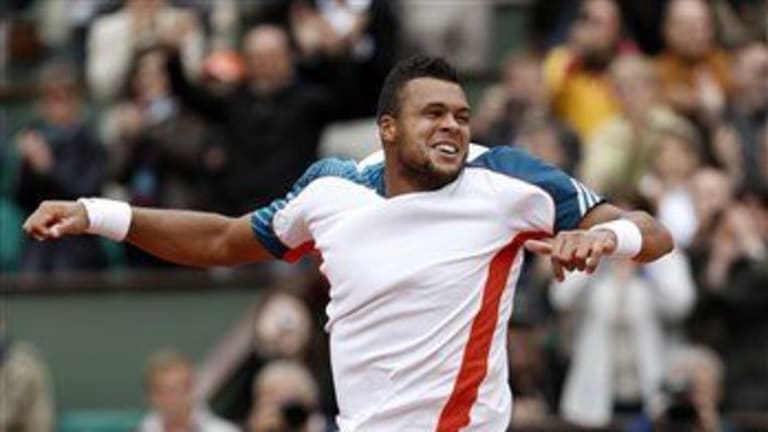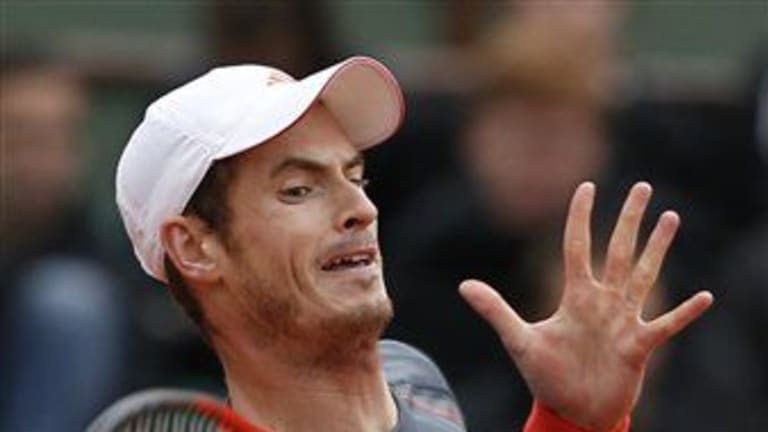PARIS—We’ve gone from sunny to cloudy to cold—get-under-your-skin cold—in three days here. The Parisians appeared to be prepared. They broke out their scarves and jackets and turtlenecks for the occasion, but it still didn’t leave them in a very good mood. It was a boo-bird’s paradise on Monday at Roland Garros. The fans booed the chair umpires whenever they made a call against a French player. They booed Maria Sharapova for taking too long to win. They booed Andy Murray for walking onto the court, and for grabbing his bad back when he got there. They even a found a way to briefly boo Rafael Nadal, who won 2, 2, and 0 over Juan Monaco. Finally, only when one of their countrymen, Richard Gasquet, was a game away from losing did they get up and do the Wave. They must have meant it sarcastically.
If players, press, and fans could have gone home and come back to do it tomorrow, most of us probably would have agreed. But the schedule was there and the tennis, no matter ugly, had to be played. Still, there are always pictures worth saving on a day at a Grand Slam. Here are a few from a cold second Monday.
Tomas Berdych has been working toward this moment. He has played some of the best tennis of his career through the spring, and beaten everyone he’s supposed to beat. In Monte Carlo he lost in three sets to Novak Djokovic; in Madrid he lost in three sets to Roger Federer; in Rome he lost in two close sets to Rafael Nadal. His fourth-rounder with Juan Martin del Potro here is another match that Berdych, if you go by the seeds, should win. But he doesn’t.
He and del Potro look like towering twin cannons firing the ball down the middle at each other. Neither moves too far wide, and each follows their winners with errors and their errors with winners. Everything evens out in the first set; neither player can break, just as neither was able to break in either set of their last match, in the semis in Madrid. Finally, Berdych earns a 5-4 lead in the tiebreaker. Looking at del Potro, I’m surprised by how calm he is. He lost that match to Berdych in Madrid, and has been having knee problems—“I can’t stand this anymore!” he yells in the middle of the first set, staring down at his knee. But he seems to have it all under control now. Del Potro knows, as he says later, that “the conditions were heavy; it isn’t like Madrid.” More crucially, he also seems to know Berdych will blow it in the end. Del Potro is right. At 6-6, Berdych catches a forehand late and hits it wide, then slugs a regulation backhand five feet long.
Del Potro and Berdych are similar in many ways, but the Argentine has a little more feel, a little more flexibility, something more supple, both in the way he moves on clay and the way he makes contact with the ball. It’s enough to get him through to play Federer in the quarters. How will he approach that match, against a man he hasn’t beaten in three years?
“Try to play unbelievable,” del Potro says without hesitation. “Try to take my opportunities, serve 100 percent, try to play winners with my forehand, with my backhand. . . . Look for unbelievable shots.”
That’s it? Sounds like it’s in the bag.
When Berdych lost to Federer in Madrid, he looked slightly stunned. Today he’s expressionless in defeat—his eyes seem to be somewhere beyond disappointment. The moment he’s been working toward has come, and gone. Once again, a tennis player is what he is, and he can only change and improve so much. Afterward, Berdych complains vaguely about the lack of lights at Roland Garros and having to come back the next day, but gives up quickly.
“It just didn’t happen."
Maybe it’s because I’m in Paris, but Jo-Wilfried Tsonga puts me in mind of a mime. During his four games on court today, he acts out his private frustrations and anxieties for all of us, sometimes in inscrutable ways. After missing a volley, Tsonga stops, laughs, and looks back to where the ball has landed, as if he wants to try the shot again. After he misses a ground stroke, he stares into the photographers’ pit. Has a click bothered him? It doesn’t seem so; he’s just looking there. When one of his poorly hit drop shots is put away, Tsonga points to where it was supposed to go—it’s unclear if he’s blaming himself or the ball.
Tsonga begins serving at 4-2 in the fifth set against Stan Wawrinka, but loses the first two games. He says later that he has spent the whole night thinking about how he’ll play, and when the moment comes, he freezes. Then, up 5-4 with Wawrinka serving, Tsonga tries something different. He backs up. He gives himself a little more time, and forces Wawrinka to create his own pace. It works. Tsonga uses his extra milliseconds to slide into a winning backhand pass, and on match point he works his way forward for a putaway forehand. He acts out one last private feeling—relief—as he leaps across the court in celebration.
“All night and this morning,” Tsonga says, “I thought about how I would do, how I will play, and if I will win or not. Then when I won the last point, you know, I felt free. That’s why there is a lot of emotion.”

